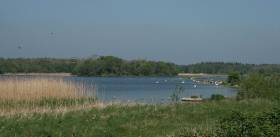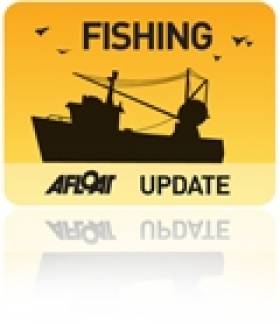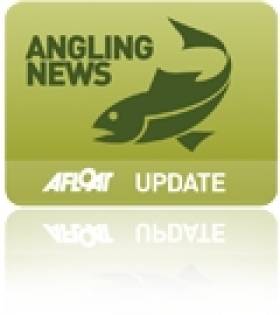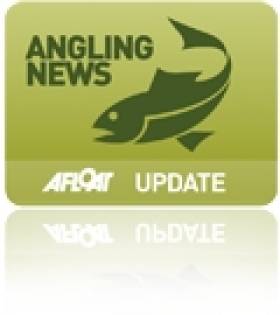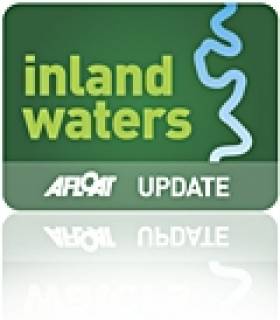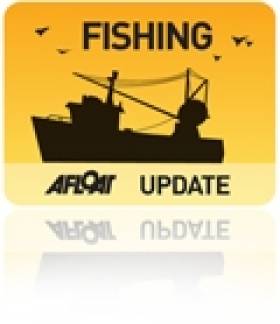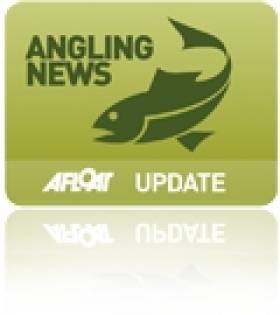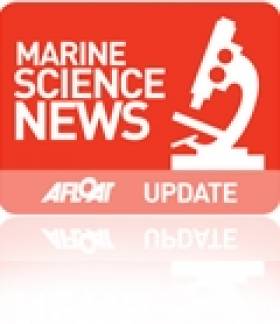Displaying items by tag: Fish stocks
Fish Stock Survey On Lough Ennell This Week
#Angling - Inland Fisheries Ireland (IFI) is currently carrying out a fish stock survey on Lough Ennell, near Mullingar, to assess the current status of the fish populations in the lake.
The survey takes place from today (Tuesday 19 September) till the Friday (22 September) and will involve netting throughout the lake undertaken by IFI staff from Limerick and research staff from Citywest headquarters crewing a total of two boats.
It’s expected that the survey will provide a range of information on the fish stocks in the lake, such as size distributions of fish captured, age and growth information for all species, diet of selected species, and catch per unit effort (CPUEs) for each fish species.
Samples for genetic analyses of brown trout and pike will also be taken. The information collected will assist IFI in managing, conserving and monitoring any changes in the fish stocks of the lake.
The survey crews will be very visible on the lake and all sets of nets will be marked with distinctive buoys labelled ‘IFI Survey’. Any anglers or other lake users are asked to be vigilant if out and about on the lake to avoid snagging in the nets.
Further details on the background of this survey are available on the IFI website.
Sustainability of Fish Stocks Improving Says Minister
#Fishing - Dr Peter Heffernan, CEO of the Marine Institute, presented the Minister for the Marine Simon Coveney with The 2012 Stock Book ahead of the EU Fisheries Council negotiations next week, noting an improvement in certain fish stocks with a higher number of stocks sustainably fished in 2012 compared with 2011 - as Tom McSweeney writes about in his column last Friday.
The Stock Book gives an overview of 59 stocks from which Ireland has an EU quota allocation and will be used to inform discussions and decisions on Total Allowable Catches (TACs) fishing quotas for 2013. TACs and quotas will be decided at the December EU Fisheries Council on 18-20 December which will be attended by the minister, who has lately faced criticism over the proposed deep-sea salmon farm in Galway Bay.
Minister Coveney said: "I welcome the comprehensive review carried out by the Marine Institute showing the state of fish stocks that are of importance to Ireland. Of the 59 stocks in which Ireland has a share of the EU TAC, 42% are now fished sustainably compared to 36% in 2011. The state of the resource base in terms of the biomass, the population of mature fish in the stock, has also improved. The number of depleted stocks has declined from 12 to 8.
"It is good to see progress on delivering sustainable fishing. Further efforts are needed both in terms of setting TAC levels and also taking other measures such as reducing catches of juvenile fish and dealing with unacceptable levels of discards.
He added: "Having the latest scientific information at my fingertips is essential at the December council. My approach to the negotiations will be to utilise this science to ensure EU fishing policy secures the long term sustainability of the industry.
"The December Council negotiations must concentrate on achieving a more practical and pragmatic regime for the fishing industry, grounded in the scientific data available in the Stock Book.”
The Stock Book advice is developed using the latest available research, assessments and advice on the fisheries resource. Irish scientists collaborate with other international scientists at the International Council for the Exploration of the Seas (ICES).
“ICES is a key forum for Ireland where our scientists develop impartial scientific advice that meets best international standards,” said Dr Heffernan.
The Stock Book is presented annually to Department of Agriculture, Food and the Marine. The information is of vital importance in serving Ireland during the annual TAC negotiations at the various EU Council of Fisheries meetings, but principally at the December council meeting where the quotas for the following year are set.
It is also of interest to a wider audience, including the fishing industry, marine scientists, managers, environmental NGOs, third level institutes, financial institutions and those with an interest in the status and management of marine fisheries resources in the waters around Ireland.
The Stock Book has been published by the Marine Institute since 1993 and has evolved considerably in that time period. It continues to evolve in a changing fisheries advisory environment. The Stock Book is available electronically on the Marine Institute’s website HERE.
#ANGLING - Plans to bring forward the estuary draft net season "would have a detrimental effect" on spring salmon stocks, writes Derek Evans in The Irish Times today.
Evans was responding to proposals before Minister of State for Natural Resources Fergus O'Dowd to extend the draft net season from its current start date of 12 May to mid-April.
"At a time when we are beginning to see the benefits of the 2006 drift net closure coming to fruition in terms of salmon returning to our lakes and rivers," he writes, "is it not absolutely unreasonable to even consider such an application?"
He referred to anglers who have "played their part" by sticking to a "suite of regulations" introduced by the State in an effort to conserve river stocks, which include a doubling of the salmon licence fee and an annual bag limit restricted to 10 fish.
Spring salmon angling is also a significant attraction for tourism, he suggests, and any threat could damage that business.
The minister's office has issued a statement saying there no proposal currently under consideration to bring forward the start date.
NI Anglers Take to Facebook to Save Their Salmon
#ANGLING - Northern Ireland river anglers are taking a novel approach to lobbying Stormont over salmon exploitation by harnessing the power of social networking.
According to the News Letter, the NoSalmonNets campaigners "have swapped their fishing rods for laptop computers", using Facebook to attract support for their campaign to bring an end to the offshore netting of wild salmon stocks.
As previously reported on Afloat.ie, Northern Ireland's Department of Culture, Arts and Leisure (DCAL) has called for a voluntary ban on offshore salmon fishing, following new research that shows a significant drop in their numbers in the North's rivers.
Seamus Donnelly of NoSalmonNets has welcomed DCAL's recent decision to stop issusing licences for commercial salmon nets that may "contravene European law" off Antrim's north coast, made in an effort to protect salmon stocks in the Foyle river system.
Donnelly explained that the campaign was borne from frustration at the apparent inaction by the NI Executive over the protection of salmon.
“One of the keys to our success has to be Facebook," he said. "The internet has an unlimited reach and we took advantage of that.”
The News Letter has more on the story HERE.
#INLAND WATERWAYS - Inland Fisheries Ireland (IFI) has announced the results of studies on the genetic makeup of brown trout stocks in the Suir and Boyne river catchments.
These studies form part of a wider scheme looking at Ireland's larger riverine catchments - assisted by the Office of Public Works, geneticists from UCD and trout anglers across Ireland - and involve a chemical analysis of scale samples from fish known as 'micro-satellite DNA analysis'.
The results from the Suir and Boyne are described by IFI as "quite amazing" and "of significant value" to managing the fisheries in these areas.
In both catchments, the first step saw trout stock samples of young fish examined genetically, and they were shown to be discrete - in other words, fish from any given tributary were found to be genetically different to those from others.
The next step involved samples of adult fish from the main river, contributed by anglers, which were then related to the different tributary genetic types.
Summary results from the Suir and Boyne show that there are respectively seven and five distinct families of trout in the catchment area; that most fish born in tributaries migrate to the main stem till adulthood before returning to their tributaries to spawn; that numbers migrating from individual tributaries are variable, but fish don't cross into adjacent catchment areas; and that there movement of young trout along the river system is "extraordinary", with fish often migrating from near the source to the mouth.
More details on findings for the Suir catchment and Boyne catchment are available on the IFI website.
Minister Shows Displeasure With Euro Fishery Plans
#FISHING - The Minister for the Marine has spoken out over plans by the European Commission to make cuts in certain fish stocks that could see €65 million in lost earnings for Ireland's fishing fleet.
According to The Irish Times, Minister Simon Coveney said there was "very credible data prepared by the Marine Institute to back up" the case against proposals by EU maritime affairs commissioner Maria Damanaki to cut certain stocks by as much as 25%.
He told the paper he would "challenge anyone to say we are not sticking with scientific advice", and also suggested that the fishing industry is being more responsible in its own proposals.
"The European Commission is recommending a 60 per cent increase in the total allowable catch for Celtic Sea herring, whereas the industry is seeking 30 per cent as a more responsible approach,” said Minister Coveney.
“So this shows it is not true to say that fishermen are irresponsible, as some would suggest."
EU fish talks continue today in Brussels. The Irish Times has more on the story HERE.
Notice of Angling Reservoir Closures in Northern Ireland
Northern Ireland Water has announced that some of its reservoirs will be closed to angling temporarily from next January to facilitate refurbishment work.
The water levels on the reservoirs in the DCAL Public Angling Estate work be lowered on a phased basis from next year by Northern Ireland Water.
Ahead of that work, fisheries staff will be reducing fish stocks in the interest of welfare.
The fisheries will be closed from the start date of the works until the refurbishment work is completed, water levels restored and stocking re-commenced stocking, which could take up to a year.
Anglers will be notified of the details of the temporary closures of Public Angling Estate waters on the Department’s website
Full details will be available online for anglers at www.nidirect.gov.uk/angling.
Closure dates (subject to change) are listed below:
Portavoe - January 2012
Copeland - January 2012
Lough Mourne - April 2012
Lower South Woodburn - November 2012
Middle South Woodburn - March 2013
Upper South Woodburn - August 2013
North Woodburn - January 2014
Irish to Lead Europe in Research Vessel Productivity
These figures compare favourably with our European counterparts, reflecting a high level of activity on national and international research and monitoring programmes.
Work duties in 2011 for the Galway based vessels will range from fisheries surveys to underwater mapping and from climate studies to deepwater surveys with the remotely operated submersible ROV Holland 1. The work schedule will facilitate training missions and to carry out essential maintenance work on Ireland's network of data buoys that, in parallel to their research function, supply the vital information on which weather and shipping forecasts are based.
The increased activity of the research vessels reflects the growing imperative to understand and sustainably manage the economic potential of our offshore marine territories, an area over ten times that of Ireland itself.
A major role of the ships' workload will be commercial fish stock assessments. Together they are to devote 141 days on stock surveys in support of the sustainable management of Ireland's fisheries.
The RV Celtic Voyager will conduct underwater television surveys of valuable prawn stocks off the Aran Islands, the Irish and Celtic Seas, working on blue whiting, a survey of herring stocks in the north-west. In addition a comprehensive 54-day annual Irish Groundfish Survey which will take place in stages all around the Irish coast from September to December.
The survey will be the largest undertaken by an Irish research vessel and is essential to providing the scientific data used to inform the annual quota negotiations required in Brussels each year.
For the 2011 schedule for both vessels is available to view by clicking HERE and the Maritime Institute website click this link.
At 65.5m RV Celtic Explorer (2,425grt) accommodates 35 personnel and up to 21 scientists and 31.4m RV Celtic Voyager (340grt) with up to 8 scientists and a maximum endurance of 14-day days. For detailed technical specifications of the Dutch built vessels, RV Celtic Explorer, click here to download a PDF file and for the RV Celtic Voyager click here
For further information contact: Dr John Joyce, Communications Manager of Marine Institute on 087 2250871




























